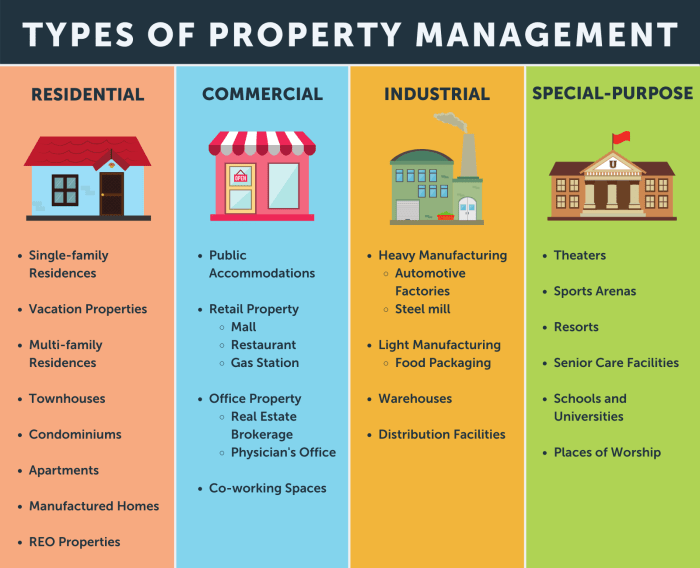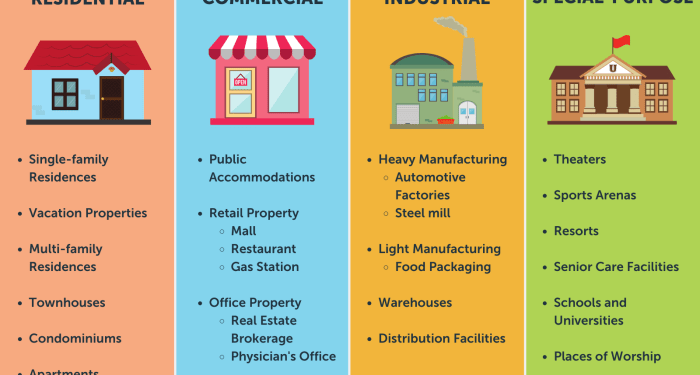Diving into the realm of real estate property management, this introduction sets the stage for an informative journey into the intricacies of managing properties effectively. From defining the concept to exploring its significance, this guide offers a valuable insight into the world of property management.
As we delve deeper, we will uncover the roles and responsibilities of property managers, strategies for successful management, tips for maintaining tenant relations, navigating legal aspects, handling maintenance and repairs, and the financial intricacies involved in property management.
Introduction to Real Estate Property Management
Real estate property management involves overseeing and maintaining properties on behalf of the owner. This includes handling day-to-day operations, ensuring the property is well-maintained, and maximizing the property's value.Property management plays a crucial role in real estate by ensuring that properties are well taken care of and generating income for the owner.
It helps to preserve the property's value, attract and retain tenants, and ultimately maximize the return on investment for the owner.
Tasks Involved in Property Management
- Marketing the property to attract tenants
- Screening and selecting tenants
- Collecting rent and handling finances
- Maintaining the property and addressing repairs and maintenance issues
- Enforcing lease agreements and handling tenant concerns
Role of a Property Manager
Property managers play a crucial role in overseeing real estate properties on behalf of owners. They are responsible for a wide range of tasks to ensure the smooth operation and maintenance of the properties.
Responsibilities of a Property Manager
- Collecting rent from tenants and enforcing lease agreements.
- Maintaining the property and addressing any repairs or maintenance issues.
- Advertising and showing vacant units to prospective tenants.
- Screening potential tenants by conducting background checks and verifying references.
- Handling tenant complaints and resolving conflicts between tenants.
Skills and Qualities Required
- Strong communication skills to interact effectively with tenants, property owners, and contractors.
- Organizational skills to manage multiple properties and tasks simultaneously.
- Problem-solving abilities to address issues that arise in a timely and efficient manner.
- Knowledge of landlord-tenant laws and regulations to ensure compliance.
Comparison to Other Roles in Real Estate
While real estate agents focus on buying and selling properties, property managers are primarily concerned with the day-to-day operations of rental properties. Unlike real estate investors who focus on acquiring properties for investment purposes, property managers are responsible for the ongoing management and maintenance of properties to ensure profitability for owners.
Property Management Strategies
Effective property management requires the implementation of various strategies to ensure the smooth operation and maintenance of real estate properties. These strategies are essential for maximizing the property's value and ensuring tenant satisfaction.
Utilization of Technology in Property Management
Technology has revolutionized the field of property management, allowing for more efficient operations and better communication with tenants. Property managers can now utilize software platforms for tasks such as rent collection, maintenance requests, and property inspections. This not only streamlines processes but also improves overall tenant experience.
Proactive Maintenance Planning
- Implementing a proactive maintenance plan can help property managers address issues before they escalate, saving time and money in the long run.
- Regular property inspections and preventative maintenance schedules can help identify potential problems early on and ensure the property remains in top condition.
Effective Tenant Communication
- Establishing clear lines of communication with tenants is crucial for successful property management.
- Responding promptly to maintenance requests, addressing concerns, and keeping tenants informed of any updates or changes can foster positive relationships and tenant retention.
Data-Driven Decision Making
- Utilizing data analytics to make informed decisions regarding rent pricing, property improvements, and marketing strategies can help property managers optimize their operations and ensure profitability.
- Monitoring key performance indicators and trends can provide valuable insights into the property's performance and help identify areas for improvement.
Tenant Relations and Communication
Maintaining good tenant relations is crucial in property management to ensure tenant satisfaction, retention, and overall property success. Effective communication between property managers and tenants plays a significant role in fostering positive relationships and resolving issues promptly and efficiently. Here are some tips for handling tenant relations and communication professionally:
Importance of Good Tenant Relations
- Establishing trust and rapport with tenants can lead to better cooperation and compliance with property rules and regulations.
- Positive tenant relations can result in longer lease agreements, reducing turnover and vacancy rates.
- Happy tenants are more likely to take care of the property and report maintenance issues promptly, preserving the property's condition.
Effective Communication Methods
- Utilize various communication channels such as email, phone calls, text messages, and in-person meetings to cater to different tenant preferences.
- Ensure clear and timely communication regarding rent payments, maintenance requests, lease agreements, and any property-related updates.
- Listen actively to tenant concerns, feedback, and requests to demonstrate attentiveness and address issues promptly.
Tips for Resolving Conflicts
- Remain calm and professional when dealing with tenant conflicts, actively listening to understand the root cause of the issue.
- Communicate openly and transparently, providing clear explanations and potential solutions to address tenant grievances.
- Seek to find a compromise or resolution that is fair to both parties, maintaining a respectful and cooperative attitude throughout the process.
Legal Aspects of Property Management
Property managers have numerous legal obligations towards both tenants and property owners to ensure a smooth and compliant rental process. Understanding and adhering to real estate laws and regulations is crucial to avoid potential legal issues that may arise during property management.
Legal Obligations of Property Managers
- Complying with Fair Housing Laws: Property managers must adhere to fair housing laws to prevent discrimination against tenants based on race, color, religion, sex, national origin, familial status, or disability.
- Maintaining the Property: Property managers are responsible for ensuring that the rental property meets health and safety standards as required by local ordinances.
- Handling Security Deposits: Property managers must properly handle and account for security deposits in accordance with state laws, including returning deposits within the specified timeframe.
- Enforcing Lease Agreements: Property managers must enforce lease agreements fairly and consistently, ensuring that both tenant and landlord rights are upheld.
Common Legal Issues in Property Management
- Evictions: Property managers may encounter legal challenges when dealing with evictions, including following proper eviction procedures and timelines as Artikeld by state laws.
- Property Damage: Addressing and resolving disputes related to property damage caused by tenants can lead to legal issues if not handled appropriately.
- Non-Compliance with Lease Terms: Property managers need to ensure that tenants comply with lease terms to avoid legal conflicts, such as unauthorized subletting or failure to pay rent.
Ensuring Compliance with Real Estate Laws
- Regular Training and Education: Property managers should stay updated on current real estate laws and regulations through ongoing training and education programs.
- Documentation and Record-Keeping: Maintaining detailed records of all interactions with tenants, property inspections, and lease agreements can help property managers demonstrate compliance with legal requirements.
- Consulting Legal Professionals: When in doubt or facing complex legal issues, property managers should seek guidance from legal professionals specializing in real estate law to ensure compliance and mitigate risks.
Maintenance and Repairs

Property managers play a crucial role in overseeing maintenance and repairs for real estate properties. They are responsible for ensuring that the property is well-maintained, safe, and in good condition for tenants. By staying on top of maintenance issues and promptly addressing repairs, property managers can help preserve the value of the property and enhance tenant satisfaction.
Preventative Maintenance Strategies
- Regular Inspections: Conducting routine inspections of the property can help identify potential maintenance issues before they escalate.
- Scheduled Maintenance: Establishing a maintenance schedule for tasks such as HVAC servicing, plumbing checks, and roof inspections can prevent costly repairs.
- Landscaping and Groundskeeping: Maintaining the landscaping and outdoor areas not only enhances the property's curb appeal but also prevents issues like overgrown vegetation or drainage problems.
- Documentation: Keeping detailed records of maintenance activities, repairs, and inspections can help track the property's maintenance history and identify recurring issues.
Tips for Managing Maintenance Requests Efficiently
- Establish a Clear Communication Channel: Provide tenants with a designated method for submitting maintenance requests, such as an online portal or email, to streamline the process.
- Prioritize Urgent Requests: Respond promptly to urgent maintenance requests that affect the safety or habitability of the property to ensure tenant satisfaction.
- Coordinate with Reliable Vendors: Build relationships with trusted contractors and service providers to quickly address maintenance issues and ensure quality repairs.
- Follow-Up and Follow-Through: Keep tenants informed about the status of their maintenance requests and follow through on repairs in a timely manner to maintain tenant trust and satisfaction.
Financial Management in Property Management
Managing the finances of a property is a crucial aspect of property management. Property managers are responsible for handling financial tasks to ensure the property operates smoothly and remains profitable.
Financial Responsibilities of Property Managers
Property managers have various financial responsibilities, including:
- Collecting rent from tenants and ensuring timely payments
- Setting rental rates to maximize income
- Budgeting for property expenses
- Paying property bills and taxes
- Handling security deposits and refunds
How Property Managers Budget for Property Expenses
Property managers create budgets to plan for and track property expenses. This involves:
- Identifying all potential expenses, including maintenance, repairs, utilities, and insurance
- Estimating costs based on historical data and market trends
- Allocating funds for each expense category
- Regularly reviewing and adjusting the budget as needed
Importance of Financial Reporting and Record-Keeping
Financial reporting and record-keeping are essential for property managers to:
- Track income and expenses accurately
- Evaluate the property's financial performance
- Provide transparency to property owners and stakeholders
- Comply with legal and tax requirements
Last Recap
In conclusion, real estate property management is a multifaceted field that requires a blend of skills, knowledge, and expertise. By mastering the art of property management, individuals can ensure the smooth operation and success of real estate ventures.
Commonly Asked Questions
What are the key responsibilities of a property manager?
Property managers are responsible for tasks such as rent collection, property maintenance, tenant screening, and lease enforcement.
How can property managers effectively communicate with tenants?
Property managers can utilize various communication channels such as email, phone calls, and face-to-face meetings to keep tenants informed and address any concerns promptly.
What legal obligations do property managers have towards tenants and property owners?
Property managers are required to uphold the terms of lease agreements, ensure property safety, and comply with fair housing laws to protect both tenants and property owners.
How do property managers budget for property expenses?
Property managers create detailed budgets that account for maintenance costs, repairs, insurance, property taxes, and other expenses to ensure the financial health of the property.
Why is financial reporting important in property management?
Financial reporting allows property managers to track expenses, monitor revenue, and provide transparency to property owners regarding the financial performance of the property.














